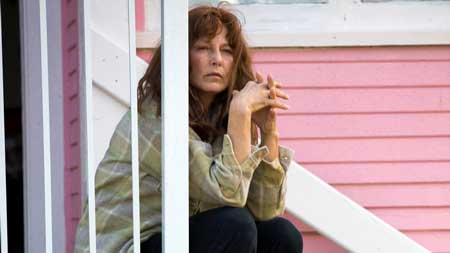Film (2018)
Written and directed by Courtney Balaker
based on the book Little Pink House: A True Story of Defiance and Courage (2009) by Jeff Benedict
Kendall Square Cinema
Cambridge, MA
With Catherine Keener (Susette Kelo), Jeanne Tripplehorn (Charlotte Wells), Callum Keith Rennie, Aaron Douglas (Governor), Colin Cunningham (Billy Von Winkle), Giacomo Baessato (Scott Bullock)

in “Little Pink House”
Image: Courtesy of Dada Films
Susette Kelo (Catherine Keener) has bought a delightful little house by the water in New London, CT and is shocked when she discovers that the state government is trying to take control of her land to enable Pfizer, a large drug company, to build an office park. Taking up arms with neighbors, and with the assistance of a lawyer Scott Bullock (Giacomo Baessato) from the Washington advocacy group Institute for Justice, Kelo goes all the way to the United States Supreme Court. Charlotte Wells (Jeanne Tripplehorn), a stylish advocate for Pfizer’s interests and an ally of the governor (Aaron Douglas), provides determined opposition to Kelo’s effort.
This entertaining but informative story of advocacy echoes films like Erin Brockovich (2000) and Silkwood (1983) which depict strongly independent women up against the dominating, and sometimes corrupt, forces of business and government. Though dramatized, Little Pink House tells its story cogently and directly, aided by titles which give a clear outline of the time sequences involved.
Catherine Keener’s Susette Kelo is appealingly determined and resolute, somewhat weatherbeaten by failed marriages and quietly vulnerable, but nonetheless insistent on fighting the big guns arrayed against her and her neighbors.
Pitting the gritty Susette Kelo against the sleek corporate advocate Charlotte Wells provides a nice dramatic touch. The fill-out-the-rest-of-the-story blurbs at the end of the film give an unexpected and interesting coda to the Wells character’s involvement in this endeavor. (The film character Wells is inspired by the actual Claire Gaudiani, President of Connecticut College and the head of the New London Development Corporation, whose role is described by Jeff Benedict is the book on which the film is based. The governor, unnamed in the film, is closely modeled after Republican John G. Rowland, who served in that role in Connecticut from 1995-2004.)
Callum Keith Rennie, as Kelo’s new found love, offers a gritty but warm presence to help provide a sweet, realistic, middle-aged romantic subplot. This secondary drama offers a gentle insight into Kelo’s vulnerabilities without becoming too dominant or sappy.
Colin Cunningham, as local shop owner Billy von Winkle, adds plenty of color as the edgy neighbor on the edge of his own elimination. He fills in the role just fine; fortunately, writer-director Courtney Balaker gives, through this role, just enough of this kind of local color to the narrative without loading it up with oddball characters.
There are some editorialized reports that suggest that the Institute for Justice initiated the idea of the film and sponsored it to some extent. The associated argument indicates that the relatively black and white depiction of moral alternatives drives from this sponsorship. According to this viewpoint, the portrayal of Claire Gaudiani via the Charlotte Wells character is particularly unfair and the portrayal of lawyer Scott Bullock, now presumably the head of Institute for Justice, unnaturally glowing.
Nonetheless, this sort of film is extremely useful in its telling of a story easily forgotten. The Supreme Court decision on Kelo v. City of New London (2005) was striking and significant, and few people are likely to know much about it or its consequences. Little Pink House, dramatizes, in a modest but effective way, the struggles of small people against big power, governmental and economic. As daunting as the story is, the film offers a sense of the possibilities that civic efforts against major interests can realize, even though the results may not be ideal.
Overall: a modest but well done account of a significant story, well worth watching, and perhaps a stimulus to studying the full complexity and ramifications of the case.
– BADMan
Leave a Reply